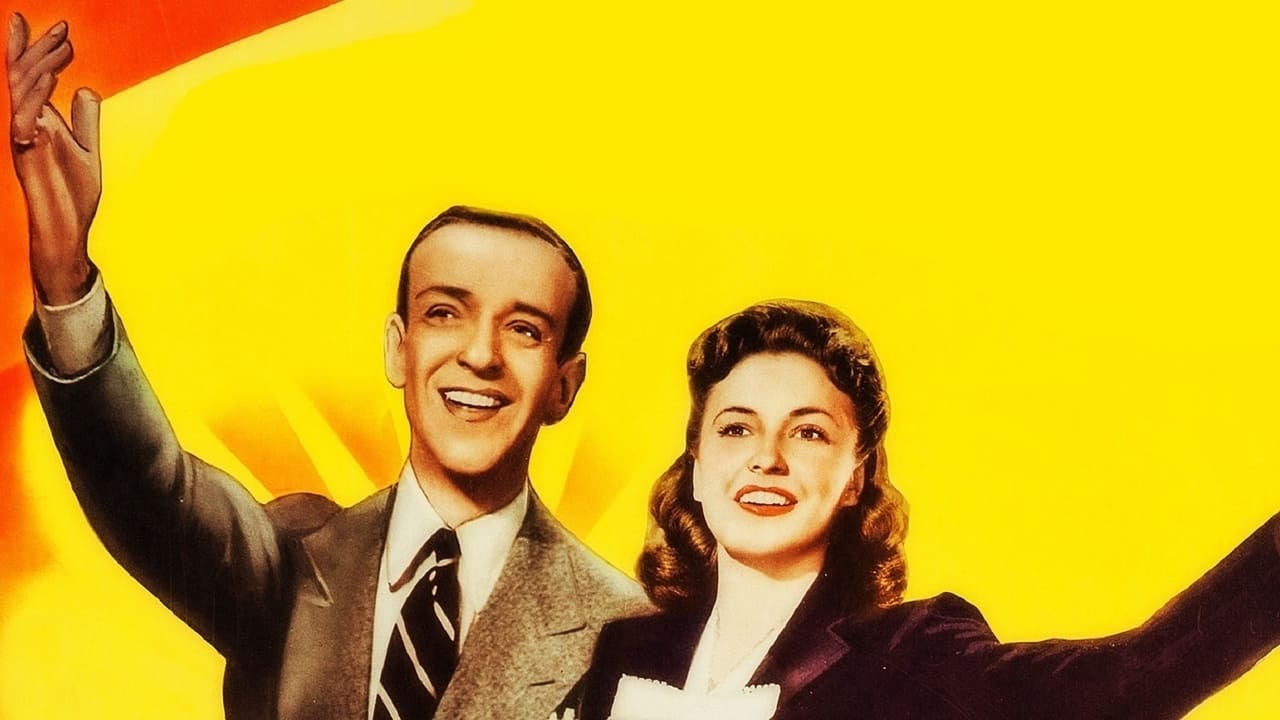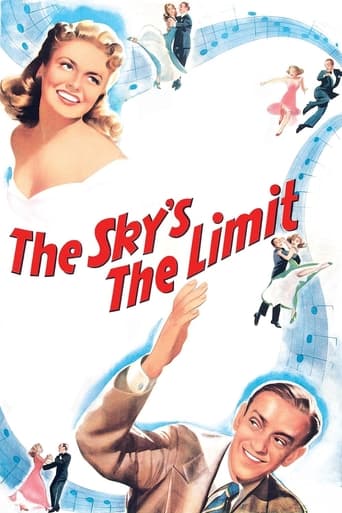

the leading man is my tpye
... View MoreThat was an excellent one.
... View MoreEach character in this movie — down to the smallest one — is an individual rather than a type, prone to spontaneous changes of mood and sometimes amusing outbursts of pettiness or ill humor.
... View MoreThis is a dark and sometimes deeply uncomfortable drama
... View MoreI'm sitting here watching our Fred, clad as a Naval aviator, about to fly off to war in a B-17 at the conclusion of "The Sky's the Limit." Navy guy, B-17, that doesn't compute, but hey, it's the movies! There's young Joan Leslie now blowing him a kiss as he flies off. Pretty typical World War II stuff for RKO.As a movie buff, you've got to give Fred credit for trying to be relevant. Yet it's amusing to read reviews and discussion threads on here regarding "The Sky's the Limit" preaching their "disgust" and how "disturbed" the reviewers are because they know, having learned to read (an accomplishment in our day and age), that he was 44 at the time and she "just" 18. (It's also amusing how we choose our modifiers in the context of and to bolster the points we're trying to make but abandon them like a dead-beat dad when it doesn't suit us!) At one point he's called a "creepy old man stalking" Joan by a poster whose icon seems a better illustration of the point. Yet being an optimist, I am at least glad that these all-knowing judges of society, presumably born in the X generation or later, aren't damning the movie for being shot in hideous and unbearably ancient black-and-white.Okay, Fred's too old for the character, I'll grant you that. Fighter pilots, even former Flying Tigers, were young guys. Most American WWII fighter pilots were a year or two on either side of 21. It was a youngster's game. The pilots in the AVG were somewhat older because they were recruited from the pre-war military, but even most of them hadn't yet seen 30 when the Flying Tigers were disbanded a few months before this film was made.Joan, otoh, always looked a little older than she really was until she crossed that line in moviedom where, like Paulette Goddard, she was then cast as women much younger than she really was. That's how Hollywood was in those days. She was cast for her bubbly personality. She was a persona. Notice in "High Sierra" she wasn't cast in the Ida Lupino role (Ida being 23 to Bogie's "creepy old" 42). Of course, nobody tried to cast Fred as Roy Earle, either--wouldn't that have been a hoot? A dancing gangster!And that's the point. Nobody was billed by their ages or cast because of them. They were who they were. Fred may have been "too old" for his character, but he couldn't do "Holiday Inn" any more, made just one year before, because of the war. With the families and friends of 15 million in the war as an audience for movies, the times demanded relevance, and give him credit for being relevant. "The Sky's the Limit" wasn't intended to be a May-December story--that's YOUR take on it. (Sorry, can't italicize on this board.) He wasn't trying to be Bogie to Audrey Hepburn's Sabrina, or Gary Cooper to Audrey Hepburn's Ariane Chavasse, Grace Kelly's Amy Kane or Suzy Parker's Kate Drummond (of course Suzy was cast in a role she was 6 years TOO OLD for, so that's okay). Btw, Coop' was a helluva guy, no? Lighten up. Director Edward Griffith wasn't promoting dirty old men. Anybody who could dance like Fred was pretty much ageless anyway. It was an interesting, even good flick. If you got distracted, you missed a good one. No screeds here from me about "ageism," although hearing it come out of the mouths of the PC crowd is pretty hilarious.One more thing, completely off point. To the reviewer who chastised the lack of credibility for editing in "World War I" footage of a bi-plane being shot down by our hero in the opening sequence, that was actual footage of a Japanese fighter, over China, being shot down, just a few years before the film was made. It's well known to afficionados of aviation in that era. Cheers!
... View MoreTrivia buffs will get a lot of mileage out of this. Sample; in the first nightclub scene the background music is Three Little Words and Can't Get Out Of This Mood. Fred Astaire made 11 musicals at RKO and 11 more at MGM. This is an RKO film - Astaire's return to the studio where he made his name as a film rather than a stage star - and they're playing a song that will be the title of a future Astaire film at MGM. Sample; having walked Joan Leslie home Astaire notices a 'Vacancy' sign and after Leslie has gone in he rents a room in the same building from landlady Elizabeth Patterson. Some fourteen years later in the film version of Pal Joey, Frank Sinatra walks Kim Novak home to her rooming house in San Francisco, notes a Room For Rent sign in the window and, after Novak has gone inside he rents a room from - you've guessed it - that same Elizabeth Patterson. In terms of statistics this has to be one of the highest percentages in terms of songs. Only three of the songs Harold Arlen and Johnny Mercer wrote were used in the final cut but two of them, My Shining Hour and One For My Baby went on to become standards which are still around today more than half a century later. Nothing with Fred Astaire in it is ever a complete loss but he could have been given more to do in terms of both song and dance. It's not as bad as Second Chorus but nevertheless it is in the bottom half of the 31 musicals made by Astaire.
... View MoreFred Astaire returned to RKO Studios, scene of his classic films with Ginger Rogers for this last film The Sky's The Limit where he plays a a Flying Tiger pilot on a furlough in the USA doing a bond tour. Of course this bond tour isn't exactly his idea of R&R so he goes AWOL on it and quite incognito embarks on a romance with Joan Leslie. She's an entertainer and also works for publisher Robert Benchley who's kind of stuck on her himself.The Sky's The Limit is the one and only time Harold Arlen wrote a score for Fred Astaire and in this case it was in collaboration with Johnny Mercer. My Shining Hour which was sung by Sally Sweetland and lipsynched by Joan Leslie got an Oscar nomination for Best Song, but lost to You'll Never Know.But it took another eleven years for One For My Baby to gain enduring popularity through Frank Sinatra singing it in Young At Heart. The song gained such popularity as a requested Sinatra item that a lot of people forget Fred Astaire introduced it.When Sinatra sang One For My Baby it was in a sequence in Young At Heart that involved him accompanying himself on a piano in a crowded bar where nobody but the movie audience is paying any attention. But in The Sky's The Limit the number serves as the main dance number for Fred Astaire. It involves a real bartender named Joe who's anxious to close played by Victor Potel. It's nicely staged and it's the main reason one should see My Shining Hour.Astaire and Leslie as leads really don't come off that good and I had a hard time believing Fred as an ace pilot. But the music is grand so watch this one once more for the road.
... View MoreYep. It's raining. It's past midnight. I'm watching the Sky's The Limit. Being that it was made in 1943, it's clearly out-dated. However, I must say, it's an enjoyable trip back in history. Made during the height of World War II, it's clearly a movie made to appeal to a war-time fan base. There are a few nice musical numbers, some outstanding dance routines, and even a few laughs. I must admit, the love story was pure fluff, but it did have a nice and upbeat innocence to it. Joan Leslie was as beautiful and talented as could be. Fred Astaire was outstanding, and Robert Benchley generated a number of laughs. There's even a young Robert Ryan in a few scenes. So, if it's a rainy, windy, late night, be sure to catch, The Sky's The Limit.
... View More